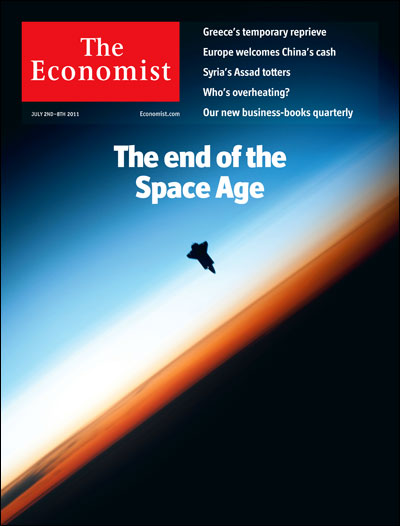So announces the cover of the July 2nd – 8th issue of the Economist.
I’m not privy to what angle the article or articles will take, but I presume the cover is referring to the retirement of NASA’s space shuttle program without a government replacement. But why need that mean the end of the space age?
Private space initiatives are picking up, though unfortunately at least some of them are being subsidized by the US federal government. But surely the relevant writers and editors at the Economist know this.
So what then is the cover implying? That without significant government involvement and decisive leadership, humanity can kiss the dream of space exploration and colonization goodbye?
Maybe they’ll also argue that the recent financial crisis, mounting government debts, and sluggish “recovery” are also factors in the premature death of the space age (thanks governments of the world!).
But still… There’s an awful lot of finality in that declaration: The End of the Space Age. Call me an optimist, but I don’t think the dream is dead yet — at least not for good.
There’s more than a whiff of sensationalist journalism here, I think, probably to drive sales and page views. Dare we give them the benefit of the doubt and suspect the motivation behind the declaration is to intentionally stretch the truth in order to shock people into saving the dream before it’s too late?
What do you think?
Update
So here’s the lead article: “The end of the Space Age: Inner space is useful. Outer space is history.”
And here’s another article from the issue: “Into the sunset:The final launch of the space shuttle brings to an end the dreams of the Apollo era.”
And here’s a retrospective: “From the archive: America’s shuttle shuffles towards launch.”
I might update this post again or blog a new one with my thoughts on the articles later on. But in the meantime, what say you?















